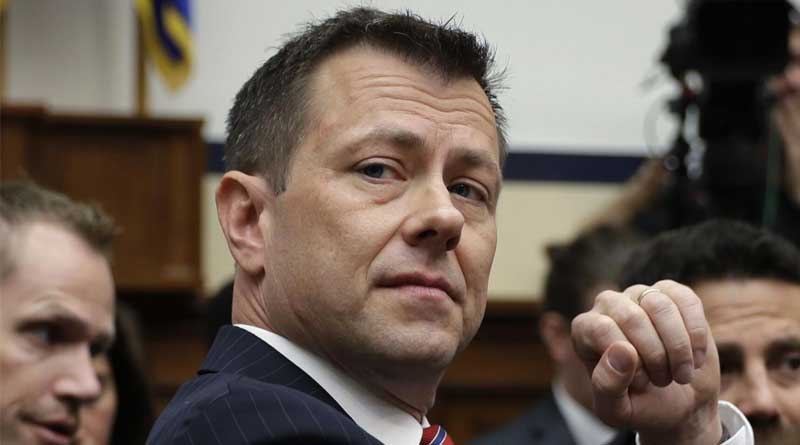Photo: FBI Deputy Assistant Director Peter Strzok is seated to testify before the the House Committees on the Judiciary and Oversight and Government Reform during a hearing on “Oversight of FBI and DOJ Actions Surrounding the 2016 Election,” on Capitol Hill, Thursday, July 12, 2018, in Washington.
Photo Credit: Evan Vucci / AP file photo
Eric Felten / RealClearInvestigations –
Opponents of President Donald Trump are now using their denial of proven 2016 surveillance of the Trump campaign to dismiss charges of 2020 election fraud as merely more falsehoods by the president.
Recently, USA Today reporters Kevin Johnson and Kristine Phillips described as “debunked allegations” claims that Trump’s team had been spied on, while reporting that Attorney General William Barr, a prominent leveler of the charge last year, was now opening the Justice Department to “claims of partisan interference” with a new directive to investigate credible claims of voting irregularities.
Lesley Stahl, in her “60 Minutes” interview with President Trump ahead of the election, refused to even discuss the spying charge, rejecting it as unverified and untrue.
Sen. Charles Grassley says Stahl and other journalists are denying facts that have not only been verified but proven: “The FBI ran confidential informants against multiple Trump campaign aides in the lead-up to the 2016 election,” the Iowa Republican told RealClearInvestigations. “They aggressively sought and received secret warrants to eavesdrop on Carter Page’s communications – warrants that were repeatedly renewed despite many critical flaws and omissions of exculpatory evidence. These facts are indisputable,” Grassley said. “Call it whatever you want to call it, but if this isn’t spying, I don’t know what is.”
It has indeed been verified that the FBI took the extraordinary step of investigating a presidential campaign. It has also been verified that the bureau drew on its complete arsenal, including wiretaps and secret agents – both in-house “Undercover Employees” and contract operatives called “Confidential Human Sources.” FBI Confidential Human Source [CHS] Stefan Halper used his cover as a Cambridge professor to cozy up to both Trump campaign advisers Carter Page and George Papadopoulos and pump them for information.
It’s no mere debating point, this question of whether to call the FBI’s snooping “spying.” The Center for Ethics at the University of Pennsylvania and an activist group called Citizens for Responsibility and Ethics in Washington (CREW) would like to see prosecuted some of those who describe the FBI’s methods as “spying,” including the attorney general: “Did Mr. Barr agree to investigate unfounded allegations for the purpose of supporting the talking points of a political campaign?” asks the ethics center report. “If so, such actions would violate the Hatch Act,” which limits federal employee participation in partisan political activities.
The University of Pennsylvania paper claims that DOJ Inspector General Michael Horowitz “refuted” the claims that the FBI spied on the Trump campaign. RealClearInvestigations asked the report’s lead author, Claire Finkelstein, to point to passages in Horowitz’s reports that do this. The UPenn professor responded with a three-sentence quote from the inspector general. The first sentence reads: “We found no evidence that the FBI used CHSs [Confidential Human Sources] or UCEs [Undercover Employees] to interact with members of the Trump campaign prior to the opening of the Crossfire Hurricane investigation.”
That does not mean the FBI didn’t send secret agents to gather information on the Trump campaign, just that the spying did not begin until after Crossfire Hurricane was officially launched at the end of July 2016.
The second sentence of the quote Finkelstein referenced states: “After the opening of the investigation, we found no evidence that the FBI placed any CHSs or UCEs within the Trump campaign or tasked any CHSs or UCEs to report on the Trump campaign.”
In other words, the spies cozied up to individuals affiliated with the campaign and pumped them for information. The fact that the informants did not themselves join the campaign as moles doesn’t mean they weren’t spying.
The last sentence states, “Finally, we also found no documentary or testimonial evidence that political bias or improper motivations influenced the FBI’s decision to use CHSs or UCEs to interact with Trump campaign officials in the Crossfire Hurricane investigation.”
Again, this is an admission that the FBI used paid informants to gather intelligence on the Trump campaign. The inspector general doesn’t write that there was no spying, just that the hiring of the spies was not motivated by “bias.”
Those claiming that the accusation of spying has been “debunked” rely heavily on Inspector General Horowitz’s repeated statements that he had not been able to prove the FBI was motivated by political bias. Does that really mean there wasn’t well-documented bias?
August 8, 2016, a week after Crossfire Hurricane was launched, FBI lawyer Lisa Page texted FBI Section Chief Peter Strzok: Trump is “not ever going to become president, right? Right?” And Strzok replied, “No. No he’s not. We’ll stop it.” According to Horowitz, “The messages raised serious questions about the propriety of any investigative decisions in which Strzok and Lisa Page played a role.”
Strzok didn’t just play a role; he “was directly involved in the decisions to open Crossfire Hurricane,” Horowitz wrote.
In response to Horowitz’s report, FBI Director Christopher Wray acknowledged that the bureau “failed to meet the standard of conduct that the FBI expects of its employees – and that our country expects of the FBI.” U.S. Attorney John Durham has been investigating those failures for over a year.
Compelling evidence of election fraud will either be uncovered or not. But that will require a willingness of the media to judge the evidence fairly, not a habit of declaring demonstrable facts to have been “debunked.”


